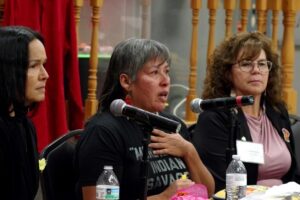Film screening and panel discussion acknowledges Sisters in Spirit Day

By Rick Garrick
FORT WILLIAM — The impact of the loss of a young Indigenous woman was highlighted during the screening and panel discussion for Audrey’s Story, a film by Indigenous filmmaker Michelle Derosier, on Sisters in Spirit Day on October 4. The 22-minute film, which was released by Thunderstone Pictures in 2019, highlights how the family of Audrey Anderson accessed the services of the Ontario Family Information Liaison Unit about 47 years after her death in 1972 in Sioux Lookout, located about 400 kilometres northwest of Thunder Bay, which led to the cause of her death being reclassified to “undetermined” by the Chief Coroner of Ontario and the investigation into her death being reopened after the Ontario Provincial Police (OPP) had initially deemed her death an accident in 1972. The film was screened on Oct. 4 at the Fort William First Nation Community Centre.
“The impact that I feel is that you can see it from generation to generation to generation, the cycle keeps continuing,” says Jolene Banning, a Fort William citizen and niece of Anderson. “When we look at what happened with my aunt Audrey, found on the side of the road, it was deemed an accident, she’s the one that jumped from the car.”
Banning adds that her grandparents were told to go home when they went to the OPP about Audrey’s death.
“She’s at fault for what happened to her,” Banning says. “And whenever you think of Murdered and Missing Indigenous Women,Girls, boys, that’s always the narrative spun — we are at fault for dying, we end up in the rivers and it’s our fault. It’s a … narrative that needs to stop because it’s not the truth.”
Fort William First Nation Chief Michele Solomon says the film screening and panel discussion was a great way to acknowledge Sisters in Spirit Day.
“It really tells a story of how the murder of Indigenous women is handled and not taken seriously and how our lives are not validated and not valued,” Chief Solomon says. “It was really great to come together as a community and acknowledge the day and really rally around Jolene’s family and acknowledge one of our own women, Larissa Charlie-Stillaway, who died at the hands of violence from one of our young men in the community a few years ago.”
The panel discussion was held after the film screening with Chief Solomon, Banning, and Derosier, an Eagle Lake citizen from Treaty #3, as panellists.
“I’m just really grateful and happy that the [Anderson] family was able to share Audrey’s Story with you this evening,” Derosier says during the panel discussion. “This is just an opportunity for Jolene on behalf of her family just to be able to speak to how this has impacted her and her family, not just through the years over the last five decades, but to today.”
Norma Anderson, one of Audrey’s sisters, says the film was very good.
“I’m glad they’re still showing it — maybe we can get some changes eventually,” Norma says, noting that Audrey was 19-years-old when she died. “It was very hard on us, we had gone to school and then we were told we had to go home and tell my mother. And then our whole family fell apart after that.”
Douglas Semple, a Kasabonika Lake citizen, says he knew Audrey while he was attending school in Sioux Lookout.
“She worked at the local restaurant in Sioux Lookout and we used to hang around quite a bit at the place where she worked,” Semple says, noting that they often asked her for cigarettes. “She would always give it to us, she was very nice to us. And then one day … she was gone.”

